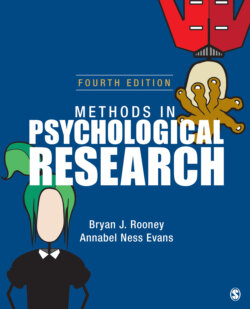Читать книгу Methods in Psychological Research - Annabel Ness Evans - Страница 61
На сайте Литреса книга снята с продажи.
Chapter Summary
ОглавлениеOur knowledge of the world comes from many sources. Believing that something is true because it has always been that way is a belief based on tradition. Believing that something is true because an “expert” said so is a belief based on authority. Believing that something is true because it feels true is a belief based on intuition. Tradition, authority, and intuition are flawed sources of knowledge. Knowledge gained through personal experience can be very powerful for the individual, but it is not objective. Reasoning (i.e., beliefs based on rational thought) and empiricism (i.e., beliefs based on measured observations) are better sources of knowledge.
Acquiring knowledge via interaction between empiricism and logic is the way of science. Scientists are critical thinkers and apply critical thinking skills in their research. Critical thinking is a process involving objectivity and unemotional examination of the available evidence. Alternative explanations are considered, uncertainty is tolerated, and skepticism is maintained.
The goals of science include description, explanation, prediction, and control.
Scientists assume that events in the world have natural causes (determinism). Scientists are empiricists; they rely on real observations to assess claims. Scientific findings must be replicated before they are incorporated into the body of knowledge. Hypotheses derived from scientific theory must be refutable through empirical research (falsifiability), and scientific explanations should require few assumptions (parsimony).
Science is defined by its method of hypothesis testing in the search for truth. A theory formally states how concepts (ideas) are related. Theory building yields hypotheses, which are tested, revised, and retested. This is the scientific method.
Researchers conduct their studies to evaluate theories, to satisfy their curiosity, to demonstrate a new technique or behavioral phenomenon, or to investigate the factors that influence behavioral phenomena.
A researcher’s goal may be to describe a population by measuring the entire population or by inferring the nature of the population from a representative sample (descriptive research), or the goal may be to explain relationships (explanatory research). Quantitative researchers in psychology are interested in differences in the amount of behavior, whereas qualitative researchers are interested in differences in the kind or quality of behavior. Basic or pure research is conducted to increase the body of knowledge of the discipline; applied researchers use that knowledge to improve things in the world. Researchers interested in age differences may study people of different ages (cross-sectional research) or may study the same people at different stages in their lives (longitudinal research). Laboratory research allows better control over variables, but field research allows a more natural setting for the behavior.
Planning research involves several steps, including selecting a research topic from theory, previous research, experience, or common sense; generating testable hypotheses using operational definitions of concepts; classifying variables; selecting the design; carefully considering the ethics; carrying out the research; analyzing the results; and drawing conclusions.
Chapter Resources
